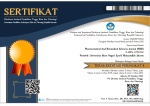The Impact of Pharmacists’ Interventions to Prevent Medication Errors at a Tertiary Hospital in Central Jakarta, Indonesia
Abstract
To promote the safety and quality of pharmaceutical services are still an issue in Indonesia. One way of doing so is to implement pharmaceutical care standards and prevent medication errors. The aim of this study was to evaluate if the intervention that conducts before and after the socialization in the standard of pharmacy service could cause a decrease in medication errors. The study was conducted by using a quasi-experimental design without a control group in outpatient pharmacy services of a tertiary hospital in central Jakarta, Indonesia. A total of 7627 prescriptions were collected prospectively by the total sampling method in April and May 2016. The observation was conducted in two stages of prescribing and dispensing. A total of 2541 medication errors identified, error rates of 16% and 33.3% were found during the prescribing and dispensing stages before socialization (April 2016), respectively. After the socialization in May 2016, the error rates of 15.2% and 20.2% were found in the prescribing and dispensing stages, respectively. However, the differences pre- and post-socialization were not significant (p>0.05). The greatest decrease in medication error was found on drug labels, which fell from 721(21%) to 458 (11%). Observations on near-miss events based on a risk matrix showed that these were dominated by a low-degree of risk. Based on these results, it could be concluded that the intervention given to pharmacists could decline medication errors. Nevertheless, further study with a greater amount of time and better pharmacist socialization is required.
Keywords
References
Al-Dhawailie (2011) ‘Inpatient Prescribing Errors and Pharmacist Intervention at a Teaching Hospital in Saudi Arabia’, Saudi Pharmaceutical Journal. King Saud University, 19(3), pp. 193–196.
Alfansi, L. and Atmaja, F. T. (2009) ‘Service Failure and Complaint behavior in the Public Hospital Industry: The Indonesian Experience’, Journal of Nonprofit and Public Sector Marketing, 21(3), pp. 309–325.
Alldred, D. et al. (2016) Interventions to Optimise Prescribing for Older People in Care homes ( Review ), Cochrane Database of Systematic Reviews. Cochrane Collaboration.
Aronson, J. K. (2009) ‘Medication Errors: Definitions and Classification’, British Journal of Clinical Pharmacology, 67(6), pp. 599–604.
Avery, A. et al. (2012) Investigating the Prevalence and Causes of Prescribing Errors in General Practice : the PRACtICe Study, http://www.gmc-uk.org/about/research/12996.asp. (accessed 10 November 2018).
Charles, K. et al. (2014) ‘Can Utilizing a Computerized Provider Order Entry (CPOE) System Prevent Hospital Medical Errors and Adverse Drug Events?’, Perspectives in health information management / AHIMA, American Health Information Management Association, 11(March 2012).
Cheung, K.-C., Bouvy, M. L. and Smet, O. A. G. M. De (2009) ‘Medication Errors: The importance of Safe Dispensing’, British Journal of Clinical Pharmacology, 67(6), pp. 676–680.
Dipiro JT, Talbert RL, Yee GC, Matzke GR, Wells BG, Posey LM. (2008) Pharmacotherapy: A phatophysiologic Approach. Seventh edition. USA: MC Graw-Hill
Ernawati, D. K., Lee, Y. P. and Hughes, J. D. (2014) ‘Nature and frequency of medication errors in a geriatric ward: An Indonesian experience’, Therapeutics and Clinical Risk Management, 10(1), pp. 413–421.
Al Rahbi, H. A. M., Al-Sabri, R. M. and Chitme, H. R. (2014) ‘Interventions by Pharmacists in Out-patient Pharmaceutical care’, Saudi Pharmaceutical Journal. King Saud University, 22(2), pp. 101–106.
Roque, F. et al. (2014) ‘Educational Interventions to Improve prescription and Dispensing of Antibiotics: A Systematic Review’, BMC Public Health, 14(1). doi: 10.1186/1471-2458-14-1276.
Salmasi, S. et al. (2015) ‘Medication Errors in the Southeast Asian Countries: A Systematic Review’, PLoS ONE, 10(9), pp. 1–19.
US Food and Drug Administration (2018) Working to reduce medication errors.US FDA, https://www.fda.gov/drugs/drug-information-consumers/working-reduce-medication-errors (accessed 8 November 2018)
DOI: 10.15408/pbsj.v1i1.12643
Refbacks
- There are currently no refbacks.






